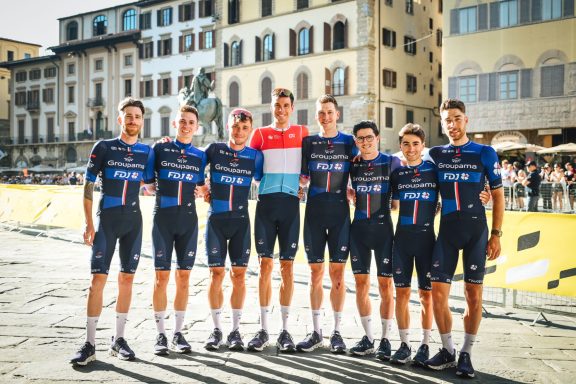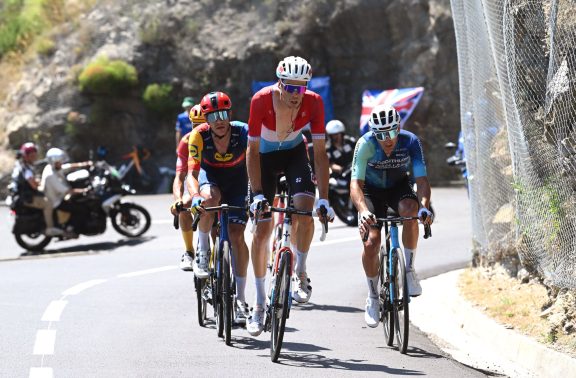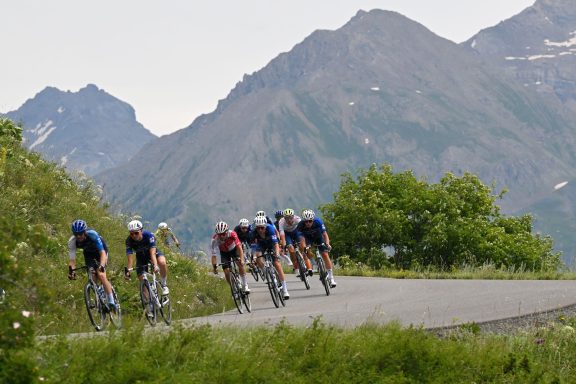On some other Tour de France, a small, harmless breakaway would have taken the lead on a profile such as that of stage 13. However, this Friday, the peloton decided to fight all day. Although Kevin Geniets and Romain Grégoire managed to enter a solid leading group at the start, the race never eased down. The young Frenchman went again with three riders a hundred kilometres from the finish, but the fight kept on going until the very end of the 165 kilometres. In a reduced peloton sprint in Pau, Clément Russo managed to sneak in seventh position. Jasper Philipsen won. It’s now time for the Pyrenees.
Before getting back to the mountains this weekend, the sprinters hoped to compete for victory again in Pau this Friday, in a short, 165-kilometre stage, without hard climbs along the way. It wasn’t a done deal, however, since many teams had other plans with the slightly hilly terrain at the start and in the final. “We knew it could be hard today,” said Clément Russo. “Everyone is a bit tired, some sprinters’ teams have lost riders, so it could be a war.” The latter started at kilometre 0 and actually only ended 165 kilometres further. The Groupama-FDJ cycling team once again actively took part in it, first putting Kevin Geniets and Romain Grégoire in a move of about twenty men after a handful of kilometres. “We didn’t expect the stage to be so fast, but we really motivated them, and we had to be vigilant at the start,” explained Benoît Vaugrenard. “We couldn’t miss this twenty-two-rider move. That was the most important thing. We had two men up there, and it was already a good option for us.” “It was a pretty crazy day, with a super-fast start,” said Romain. “It was very important for us to be in the mix straight away, and we were. We were in a strong break, with some really big names. We believed that it could go far and fight for the win. Unfortunately, the bunch wasn’t ok with some riders being in front, and so they didn’t let us go.”
“We rode hard all day”, Clément Russo
To be precise, it was the presence of Adam Yates, eighth overall, which did not allow the leading men to go clear. The peloton constantly kept the pressure on, and a real battle between the two groups took place for almost two hours of racing. The gap reached one minute at one point, but not much higher. “I tried to go again with three riders (Cort, Bernard, Kwiatkowski) 95 kilometres from the finish,” Romain explained. “However, there was wind, echelons in the back, and the nature of the race did not allow us to go that far.” “Romain was very strong,” said Benoît. “You had to be strong just to be part of the twenty-two riders at the start, then again to be able to attack later on. It didn’t go his way today, but we must keep fighting. For sure, things will turn around, for him or for us, at one point.” The peloton therefore split sixty kilometres from the finish, and the Romain Grégoire’s group was caught ten minutes later. After a difficult start to the day following his crash from the day before, Stefan Küng was part of the first bunch which bridged across. From then on, some teams tried to keep the small peloton together although a few attacks occurred in the last hour of racing. “In the end, we rode hard all day,” said Clément Russo. “The climbs in the final were rather short, but they still hurt. I held on well and the guys motivated me as well. Until then, I had not managed to get into the top ten in the sprint. They told me it could be today.”
“We’ll keep on pushing”, Romain Grégoire
Despite the attacks, the peloton got back together for the last five kilometers, and Clément Russo found his way on his own, as usual. “I tried to position myself well,” he said. “There was a crash 700 metres from the finish, but fortunately I was on the right side. I was really well positioned at 500 metres, and at 300, I thought: instead of staying in the wheels, let’s try to anticipate in order to get a little head start. Then, I obviously went backwards against the big sprinters…” On the line, the Frenchman still took a decent seventh place while Jasper Philipsen took the win. “It’s a small satisfaction even if it’s not what we’re looking for,” said Clément. “We will now focus on this weekend and try to get a victory.” “It was still a pretty positive day,” concluded Romain Grégoire. “We were at the front, and we try, again and again. We still have over a week to do it. The mindset is good, we’ll keep on pushing like this and it will end up paying off.” On Saturday, the Tour de France will enter the Pyrenees, with a fourteenth stage which will feature the Col du Tourmalet, the Hourquette d’Ancizan before a summit finish in the Pla d’Adet.



No comment